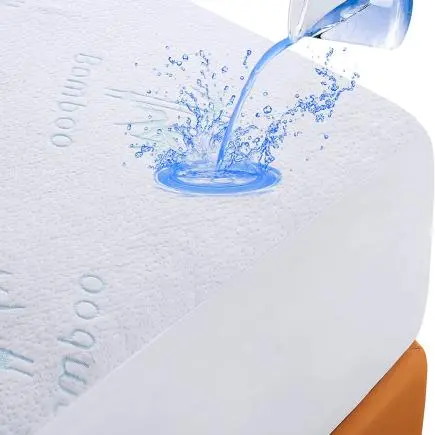Mattress covers protect your mattress and provide comfort while you sleep, but what fabric for mattress covers should you use? Are all options created equally? We’ll be answering these questions and more in today’s blog. We’re talking all about fabric for mattress covers. Because everyone deserves to sleep in a comfy bed at night!
What Is A Mattress Cover?
Before we talk about fabric for mattress covers, we should go over what a mattress cover is. Essentially, a mattress cover (or protector) is a material that covers your mattress (or part of it), protecting it from germs and helping it last longer. There are three types of mattress covers: encasement covers, fitted covers, and anchor or elastic strap covers.
An encasement cover goes entirely around your mattress, providing the most comprehensive protection. A fitted mattress cover is much like a bedsheet. You put it on your bed before you put your fitted sheet on. An anchor or elastic strap only covers the top of the mattress. In some cases, covers are fitted on the central part of the mattress to catch any spills where they’re most likely to happen.
The purpose of a mattress cover is to provide comfort and protection. An uncomfortable mattress cover will ruin your night’s sleep, leaving you exhausted and dependent on caffeine. So, above and beyond all else, choose a mattress cover that feels comfortable for you.
A mattress cover is an integral part of your bedding. Without it, you’d be sleeping on a rubbery-feeling mattress that’s just not very comfortable.
In addition to comfort, you want your mattress cover to protect your mattress. From what? Stains, wear and tear, sweat, and marks can all mar your mattress. Having a cover will protect your mattress, making it last longer and saving you money. Mattress covers provide protection from bed bugs and allergens in the mattress filling.
Types of Mattress Covers
There are lots of options to choose from when it comes to what type of mattress cover you want. There are natural and synthetic choices. You can easily get overwhelmed by the options, so you’ll want to narrow it down by what works for your current needs. Options include:
Cotton
Wool
Polyester
Vinyl
Polyurethane
Spandex
Cotton and wool are your natural choices and have benefits like not making noise when you roll over in your sleep. They can absorb sweat and keep you cool at night. Many cotton or wool mattress covers are also organic and hypoallergenic.
While natural mattress covers are attractive to many prospective customers, there’s nothing wrong with vinyl or polyester. These covers come with benefits that cotton and wool don’t.
For example, while polyester can provide a cooling element and will not wrinkle up, spandex can add a nice stretch and recovery to the cover to make it fit well. If you laminate vinyl or polyurethane to any of these fabrics, they’ll become waterproof.
What to Look for in a Mattress Cover
There are several things you should look for in a mattress cover, including:
Is it waterproof?
Is it easily cleaned?
What about temperature and airflow?
Is it comfortable?
Is it absorbent enough to handle accidents?
Having a waterproof mattress cover is the top thing most people look for. Who doesn’t enjoy a glass of ice water on their nightstand. Or maybe a glass of wine with your favorite show after a long day at work. Having a waterproof mattress cover will better allow you to enjoy your bed without the risk of sleeping in a damp, uncomfortable place. A waterproof cover can also protect you from bed bugs and allergens.
You’ll want an easy-to-clean mattress, especially if you have little ones who make messes. It’s a good idea to purchase a cover that is machine washable and dryable. That way, you can keep your mattress cover for years instead of months, especially if washing the cover becomes a weekly occurrence.
Temperature and airflow are important considerations as they take care of sweat and moisture. Thermodynamics and sweat-wicking materials will keep you clean and dry all night long. Mattress covers with an absorbent top and a breathable waterproof backing are an ideal choice.
Finally, you’ll want to consider comfort. Some mattress covers are squeaky, rub against your mattress, and are scratchy and itchy. A mattress cover is for your protection and comfort. Pick one that’s comfortable for your skin!
It might be hard to find a mattress cover that meets all of these criteria, so focus on what’s most important to you, and let the other qualities be secondary. For example, you might need a waterproof mattress cover.
Post time: Dec-14-2022






